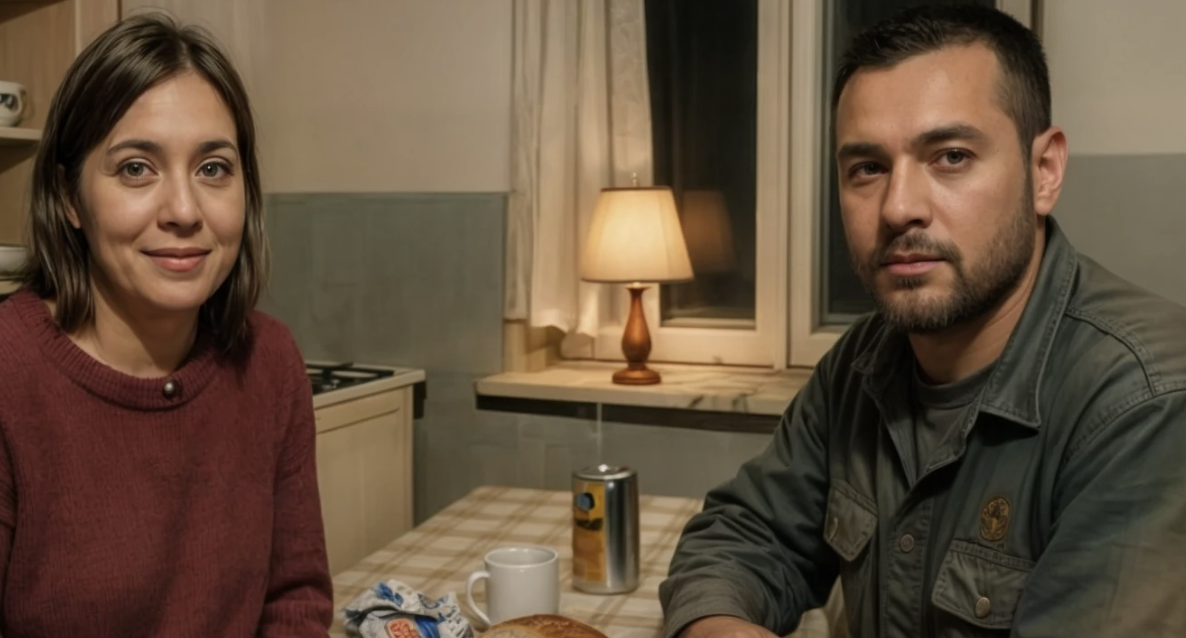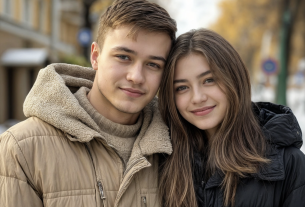It all began on a morning that seemed to promise anything but a storm. The sun was just lifting above the rooftops, tinting the sky a tender shade of peach. The air was fresh and clear, and from the fields came the sweet scent of blooming meadow grasses. Anna, as always, had risen before dawn to get all the chores done before the children went to school. She was already filling the chickens’ drinkers when her son, Seryozha, burst out of the open door of the house. His face was pale, his eyes wide with fright.
“Mom, where are you? There’s, um… a tractor!” he blurted, out of breath. “It’s pulled right up to our fence!”
Anna’s heart stopped for a second, then dropped into a cold, hollow pit. She threw down the bucket and hurried across the yard to the gate, almost running. And then she saw a sight that took her breath away. The neighbors’ massive, roaring tractor, with its powerful bucket, was ruthlessly scooping up everything in its path. It churned the soil, tore out by the roots her beloved peonies and dahlias—the ones she had cherished all these years, the very flowers that delighted her every summer with their riotous bloom. A section of the old, leaning fence she kept meaning to repair cracked under the pressure of metal and then slowly, almost reluctantly, collapsed, kicking up a cloud of dust.
“Stop! What are you doing!” Anna cried, frantically waving her arms, trying to get the driver’s attention.
But the young fellow in a mud-smeared cap at the wheel didn’t even turn around. He could clearly see her in the side mirror—that was obvious from the way he deliberately looked away. He knew—oh, he knew—what he was doing: destroying someone else’s work, someone else’s beauty, someone else’s tiny world. Hot tears of helplessness rolled down Anna’s cheeks, but she wiped them away with the back of her hand, not wanting her son to see.
Ah, how she had suffered with these new neighbors… They’d bought the house next door only three months ago, but it felt like a lifetime. At first they arrived quietly, modestly, smiling at everyone, saying all the right pretty things about an “eco-friendly lifestyle,” “oneness with nature,” and “spiritual development.” Clearly city folk. They wore expensive, branded outfits and drove a huge SUV that must have cost as much as half the village.
And then, as if the mask had dropped, the true ordeal began. They started tossing their garbage over the fence onto her property; their big, mean dog kept squeezing through holes in the fence and wrecking her neat vegetable beds; and on weekends they blasted such deafening music until two or three in the morning that the windowpanes shook. If it were only her having to endure it, that would be one thing—but she had children! Seryozha would come home from school pale, with red, sleep-deprived eyes, unable to focus on his lessons. And her little Liza, her little swallow, became frightened to go to bed at all, quietly sobbing into her pillow whenever the neighbors launched into another raucous party.
“Their dog tried to get in again,” Seryozha muttered, gripping her sleeve. “I waved a stick to chase it off, but it growled at me and bared its teeth…”
Dear God, what kind of life was this! Last month she’d finally reached her limit and, mustering all her will, went to see the local policeman, Vasily Petrovich. She pleaded with him: “Do something, Vasilych, please help, I can’t take it anymore—we can’t live like this.” To his credit, he came the very same day—and she even rejoiced, thinking that at last peace would come. He went over to talk to the neighbors and… disappeared. An hour passed, then two. He finally emerged toward evening, his face flushed, smiling in an odd, sheepish, crooked way—and sticking out of the pocket of his uniform was a conspicuously new, expensive smartphone. On his meager salary!
“Anna, don’t you go bothering decent people,” he said, avoiding her gaze. “So their music’s loud. They’re young; they want to have some fun. Can’t even sneeze nowadays without someone complaining.”
And she understood everything then. Clear as day. Money rules everywhere—even here, in this backwater village. And what could she oppose to that? Two cows that kept her family fed, a small garden, and two children on her hands. Her husband had gone to the city to earn money five years ago and… vanished as if into thin air. Disappeared. He didn’t even send alimony regularly, the scoundrel. She was on her own, running like a squirrel in a wheel, trying to make ends meet.
But Anna’s character was stubborn, reckless. She decided that if the law wouldn’t help, she’d sort it out herself. That very day she gathered all their trash scattered on her property into big plastic bags and heaved them back over the fence. That’s when the worst began… The policeman showed up in half an hour, his face contorted with anger, tapping his finger against his temple: “Are you crazy, Anna? They’ll sue you! They’ve got connections, serious ones, understand? They’ll have your kids put in an orphanage in no time, and you’ll be hauled into court!”
That was the first time she was truly afraid. Not for herself—no, for her children. She stood in the middle of her ravaged yard, clutching those very bags, tears streaming down her face in bitter, powerless torrents.
“Mom, why are you crying?” Seryozha ran up, hugged her, pressed himself against her. “Don’t cry. I’ll tell them myself—I’m not afraid of them!”
Her heart clenched with pain and pride all at once. The boy was only twelve, and already a real protector, ready to rush into battle for his family.
“Oh, son, darling, better not get mixed up with them,” she said, wiping her tears with her worn sleeve. “We’re nothing to them, just empty space—second-class people. What can we oppose to them? Nothing.”
Seryozha frowned, his lips tightening into a thin, stubborn line.
“When I grow up—just you wait—I’ll make lots and lots of money, buy us a big house, and then they’ll dance to my tune! We’ll see about that!”
“You’d better go sit with your sister and read to her,” she said gently, feeling another lump rise in her throat. “I need to get to the market—we need money, we can’t do without it.”
Every day of hers looked like the one before. Up at four, milking the cows, making breakfast for the children, getting them ready, and then the long trip to the district market. Milk, cottage cheese, sour cream, eggs—those were their main income. This wasn’t the city, where at the end of the month you’re guaranteed a paycheck. Here you survive as you can, spin and hustle, or you’ll starve and your children will have nothing to eat.
And those neighbors… They were like a thorn in the side, a constant source of anxiety and irritation. One day their dog would get into the henhouse and terrify all the chickens; another day the music would be so loud your ears rang; then some new unpleasantness would crop up. Sometimes such a wave of gloom and hopelessness rolled over her that she wanted to let her hands drop, just lie down and not get up. But she couldn’t—absolutely couldn’t. She had children, her own flesh and blood. Who needed them besides her? No one.
On that ill-fated day, she was, as usual, at her spot in the market, selling dairy products. The heat was unbearable, flies buzzed over the stalls, and there were very few buyers. The women selling nearby—same age, same weary-from-life faces—chatted quietly among themselves:
“Annushka, why so glum today? Those new ones of yours getting on your nerves again?”
“Who else?” Anna sighed heavily, pouring fresh milk into glass bottles. “We can’t get a moment’s peace from them.”
“Oh, I heard they’re throwing another big party tonight,” another chimed in. “Fancy cars have already rolled in—took over the whole street…”
Anna only waved her hand in despair. To hell with it all, she thought. And at that moment an old intercity bus wheezed up to the market stop. Its doors squeaked open, and a single passenger got off—a man. Tall, broad-shouldered, with a thick, full beard. His face was serious, even stern, and his eyes—gray, piercing, watchful. His walk was heavy, slightly rolling, like someone who’d spent many years behind bars. She recognized the type—many in their village had done time.
And then, inexplicably, something strange and troubling pricked inside her. As if an invisible spring clicked and released in her chest. She sat there staring at him wide-eyed, and he, as if sensing her gaze, turned his head and looked at her too. And suddenly, without understanding how it happened, she opened her mouth and said to the stranger:
“You must be coming from far away?”
He froze for a second, as if surprised anyone had spoken to him, then gave a short smirk.
“Yes, from very far. Been on the road three days.”
His voice was low, calm, velvety. The sound of it sent goosebumps down Anna’s back. Where had she found such boldness?
“You can spend the night with us if you’ve nowhere to go,” she heard herself say, as if the words spoke themselves. “We’re heating the bathhouse tomorrow—you can wash up. I live with my kids—Seryozha and Liza… By ourselves.”
She barely recognized herself! Was she out of her mind? Inviting a completely unfamiliar, stern-looking man into a house with just children!
The stranger hesitated a moment, then asked quietly, almost in a whisper:
“Aren’t you afraid? I’m, well… It’s obvious where I’m from.”
“I don’t know,” Anna answered honestly, surprised at her own calm. “For some reason I’m not. And there’s not much to take from us anyway—unless it’s the cows.”
He laughed, and his face transformed in an instant—grew younger, kinder, the corners of his eyes crinkling with little rays.
“My name’s Viktor.”
“Anna,” she nodded in reply.
As they walked from the market to her home, she, not even knowing why, laid out her whole life before him, like in confession. She told him about the traitor of a husband who’d abandoned his family, about the children, about those cursed neighbors, about the policeman, about the tractor, about her endless fear and exhaustion… He listened in silence, without interrupting, only nodding now and then, and his silence was the understanding, supportive kind. And when they finally reached the gate and he saw with his own eyes the chaos and ruin in the yard—the tractor tracks, the scattered trash, the twisted, half-destroyed fence—his face suddenly darkened, turning focused and stern.
“Good Lord,” was all he said. “And how long have they been treating you like this?”
“Since the day they arrived,” Anna sighed bitterly. “And what can I do? I’m alone. They have money, connections, a sense of impunity…”
At that moment Seryozha and Liza ran out onto the porch, having heard voices, and stared curiously at the stranger.
“Mom, who’s that?” Liza asked, timidly hiding behind her older brother.
“This is… this is Uncle Viktor; he’ll spend the night with us,” Anna explained a bit awkwardly, catching her son’s surprised look.
“Hello,” Liza said softly, peeking at the huge man from behind Seryozha’s shoulder.
“Hello to you,” Viktor nodded politely. “What’s your name, little girl?”
“Liza. Are you staying long?”
“We’ll see,” he smiled gently at her. “Maybe I’ll stick around a couple of days, if your mother doesn’t mind.”
And he did stay. First for a day, then a second, then a whole week… He turned out to be a workhorse—one of a kind! From dawn until late evening he was busy: repairing that very fence, hammering in new boards with the zeal of a man building a fortress; turning the garden beds; shoring up the old shed. The children loved him at once—attached to him with all their hearts. Seryozha practically followed him on his heels, and Viktor taught him manly skills; the two of them kicked a ball around the yard with gusto. For Liza he fashioned a remarkably pretty doll from scraps of wood, and she never let it out of her hands.
And how he dealt with the neighbors—that was a separate, nearly unbelievable story! On the third day of his stay, the neighbors again cranked up their infernal music to full blast, until the windows shook. Anna was about to hustle her upset children into the house when Viktor calmly rose from the bench and said firmly:
“I’m going to talk to them. Neighbor to neighbor.”
Anna’s heart lurched with fear.
“Oh, Viktor, don’t—please… They’re… unhinged. They have security, some shady types, and all that.”
“It’s fine,” he grinned mildly. “I’m not exactly made of sugar either; they won’t scare me.”
And he went. With a steady, confident stride. Anna stayed at the window, trembling with anxiety, afraid to imagine how this “heart-to-heart” might end. The children glued their eyes to the cracks in the fence, watching. Five minutes passed, and the deafening music suddenly cut off. Ten minutes later Viktor returned, just as calmly. His face was completely unruffled—even satisfied.
“What did you say to them?” Anna peppered him with questions as soon as he crossed the threshold.
“Oh, nothing much,” he shrugged his broad shoulders. “We had a man-to-man talk. I explained that it wasn’t right to behave like that.”
And miracle of miracles! From that moment, as if by the wave of a magic wand, everything changed. No more music at night, no more trash over the fence. They even chained their huge dog with a stout chain. And the neighbors themselves, when they met Anna in the street, started greeting her politely—smiling, even! At first she couldn’t believe her eyes; she thought she was imagining it.
“What on earth did you tell them? Did they really just understand and agree?” she couldn’t hold back one day, consumed by curiosity.
Viktor chuckled in his quiet, chesty way.
“Nothing special, honestly. I just politely explained that my own brother holds a high post in the prosecutor’s office, and I myself served ten years in the OMON. And that if they didn’t stop their nonsense, I’d find exactly where and to whom to complain—and complain in such a way they wouldn’t enjoy it.”
“That’s all? And they believed you? So you fibbed for effect?” Anna was astonished.
“Why fib?” Viktor feigned surprise. “My brother really does serve in the prosecutor’s office. Just not my own brother—my cousin. And not in our region, but in Khabarovsk Krai, thousands of kilometers from here.”
They both burst out laughing like old friends. And in that very moment, looking into his laughing eyes, Anna suddenly realized with perfect clarity that she had fallen in love. Truly, deeply, like a girl. In her forty-something years! Her heart fluttered fast, filling with warmth and light.
In the evenings they began sitting on the porch, drinking fragrant mint tea she gathered herself, and talking for hours about life. It turned out Viktor’s life had been full of trials and hardships too. His wife had left him for another, more successful man; then there were layoffs at work, and he was left with nothing. So he set off across the vast country, hoping to find a place where he would be needed, where he would be accepted as he was.
“Don’t leave,” Seryozha said one evening, gazing up at Viktor with pleading eyes. “Stay here and live with us! We’re so happy with you!”
Anna wanted to sink through the floor with embarrassment. But Viktor only smiled tenderly at the boy.
“Well, maybe I will stay,” he said. “If your mom doesn’t mind.”
And he looked straight at Anna—attentive, serious, putting the whole question into his gaze. Her breath caught under the surge of feeling.
“I don’t mind,” she whispered, and those two words became the most important confession of her life.
A few more weeks passed, and they went to the local registry office to get married. They did it very quietly, modestly—no lavish reception, no crowd of guests—just their closest friends. And guess what? The neighbors—the very ones who had terrorized the whole area—brought them a real, expensive wedding gift: a gorgeous coffee set of fine, almost transparent porcelain. It wasn’t just a gift; it was a sign, a symbol that the war was over and the longed-for peace had come.
A few months later, Viktor found good, steady work in the district center—as a security guard at a major bank. The pay was decent, and the schedule let him be home regularly. They even began, little by little, as they could afford it, to renovate their old but cozy, beloved house.
Sometimes, looking at him, Anna thought: how strangely life can turn out. Because of that neighbor’s tractor that crashed into her yard that morning like a barbarian, bringing destruction and pain, she had found her true, quiet, solid happiness. Life’s like that… You never know where misfortune will meet you, and where the greatest luck—the dearest gift of fate—awaits.
Seryozha now calls Viktor “Dad,” and he says it with such pride and love that Anna’s heart stops with tenderness. And Liza won’t leave his side at all, like a little kitten. Even the neighbors… The neighbors became completely different. And you know what’s most amazing? Now they even visit each other for shashlik, sit at one big table, laugh, and chat. Such incredible transformations…
And the most important thing—Anna is no longer alone. Not in the least. There is a strong, reliable shoulder beside her; a man who will always protect, always support, always hold her tight when her soul turns heavy and bleak. She never, ever would have thought that at her age—when it seemed everything had already been decided and settled—life could make such a dizzying turn, offer such a gift. And yet—here it was. Fate turned out to be quite the storyteller.
And to the soft whisper of autumn rain drumming on their roof, to the steady breathing of the children in the next room, they sat together on the old sofa, holding hands. And Anna understood that the greatest wealth is not money, not connections, not power. It is the quiet light in your window; the warmth of a familiar hand in yours; the peaceful sleep of your child and the certainty that tomorrow will be just as bright and calm. Happiness turned out to be so simple. It didn’t come with the clatter of a tractor, but with quiet footsteps down a dusty road—and it stayed for good



